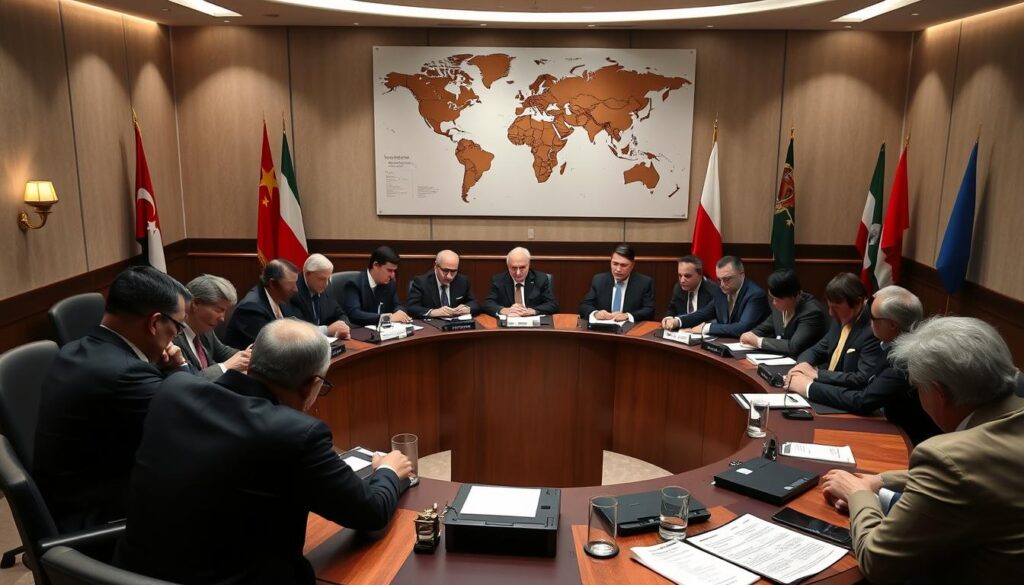In a shocking display of the ongoing tensions between Iran and Israel, a staggering 7,845 attacks were exchanged between the two nations’ forces from October 7, 2023, to September 6, 2024. With a staggering 82% of these attacks carried out by Israeli forces, the region teeters on the brink of all-out war, leaving at least 646 Lebanese and 32 Israelis dead in the process.
As the U.S. presidential election looms, the delicate balance of power in the Middle East hangs in the balance. The period between the election and the new president’s inauguration could prove pivotal, with Israeli Prime Minister Benjamin Netanyahu potentially seeking to leverage the political transition to steer Israeli policy, potentially ending the Gaza war and securing a hostage deal.
The timing of Iran’s potential retaliation is heavily influenced by the U.S. political shifts, with different strategies depending on the election outcome. Recent Israeli airstrikes on Iranian targets in October 2024 were carefully calibrated to send a strong message without sparking a full-scale war, underscoring the region’s volatile nature.
Key Takeaways
- The period between the U.S. election and presidential inauguration is a critical window for Iran-Israel relations.
- Israeli Prime Minister Benjamin Netanyahu may leverage the election outcome to steer Israeli policy, potentially ending the Gaza war and securing a hostage deal.
- The timing of Iran’s retaliation is heavily influenced by the U.S. political transition, with different strategies depending on the election result.
- Recent Israeli airstrikes on Iranian targets in October 2024 were carefully calibrated to send a strong message without causing full-scale war.
- The Middle East region remains in a highly volatile and tense state, with the potential for further escalation between Iran and Israel.
The Current State of Iran-Israel Tensions
The relationship between Iran and Israel has been characterized by a long-standing “shadow war,” but recent escalations have brought the conflict into the open. The two nations have engaged in a series of tit-for-tat attacks, raising concerns about the potential for a larger military confrontation.
Recent Escalations and Direct Confrontations
Over the past year, the crisis in the Middle East has escalated, involving multiple countries including Lebanon, Syria, Iran, and Yemen, stemming from Hamas’ attack on Israel. In April 2024, the IDF struck an Iranian consulate in Damascus, resulting in the killing of an IRGC commander and his deputy. Two weeks later, Iran responded by launching 300 missiles and drones towards Israel, mostly thwarted by a U.S.-led regional coalition.
Timeline of Recent Attacks
- In September, Israel launched an air offensive into Lebanon, resulting in the killing of Hezbollah’s leader, Hassan Nasrallah, and an IRGC general, Abbas Nilforoushan.
- Iran retaliated on October 1 by launching approximately 180 ballistic missiles towards Israel.
- As of mid-2024, Iran could produce enough highly enriched uranium to fuel one nuclear bomb in one or two weeks, requiring several months to over a year to assemble a warhead.
- Israeli warplanes reportedly destroyed mixers used to produce missile fuel in Iran, potentially taking a year or more to remanufacture.
Strategic Implications for Both Nations
The escalating conflict has significant strategic implications for both Iran and Israel. Israel has demonstrated its ability to strike deep within Iran, while Iran’s deterrence capabilities have been eroded. The overarching concern is the risk of a regional conflagration if the cycle of retaliation intensifies, involving neighboring states and major global powers such as the U.S. and Russia, with catastrophic implications.
The current state of Iran-Israel tensions is marked by a cycle of Military Escalation, with both sides engaging in Proxy Wars and Nuclear Threats. As the situation continues to evolve, the potential for a larger regional conflict remains a pressing concern for global stability.
Netanyahu’s Political Calculations During Transition
As the United States navigates the complex transition period between the elections and the inauguration of the new president, Israeli Prime Minister Benjamin Netanyahu is closely monitoring the situation. His approach and policy decisions will largely depend on the outcome of the U.S. election, as the relationship between Israel and the U.S. is a critical factor in the ongoing Middle East conflict and diplomatic negotiations.
If President Donald Trump secures a second term, Netanyahu may push to end the conflict with Iran quickly, potentially citing potential support for West Bank annexation under a Trump administration. However, if Vice President Kamala Harris emerges victorious, Netanyahu might adopt a more cautious stance, warning of a potential American crackdown on West Bank settlements. The prime minister is likely to use this transition period to shape Israeli policy, considering the unpredictability of U.S.-Israeli relations during this time.
Recent polls indicate that Netanyahu’s Likud party would still be the largest in the Knesset if elections were held, despite the ongoing regional conflicts. However, a majority of Israelis believe that Netanyahu should step down, prioritizing a potential hostage deal with Hamas over a pre-emptive strike against Iran and Hezbollah. This public sentiment, coupled with the complex geopolitical landscape, will undoubtedly factor into Netanyahu’s political calculations during the U.S. transition period.
As the situation in the Middle East remains volatile, with increased readiness levels in Israel and the deployment of additional military assets by the U.S. to deter potential Iranian or Hezbollah attacks, Netanyahu must carefully navigate the delicate balance of regional stability and his own political interests. The outcome of the U.S. election and the subsequent policy shifts will significantly impact his decision-making process and the future trajectory of the Middle East conflict.
| Scenario | Netanyahu’s Approach |
|---|---|
| Trump Wins Re-election | Push to end conflict quickly, citing potential support for West Bank annexation |
| Harris Wins | Warn of potential American crackdown on West Bank settlements |
As the world closely monitors the unfolding events, the transition period between the U.S. elections and the inauguration of the new president will be a crucial time for Netanyahu to navigate the complex web of regional dynamics and domestic political considerations.
Iran Israel Retaliation Timing: Critical Factors at Play
As tensions escalate between Iran and Israel, the timing of Iran’s potential retaliation against Israel becomes a critical factor to consider. Several key elements are shaping this complex geopolitical dynamic.
Military Readiness Assessment
Both nations have demonstrated their military prowess in recent years. Israel has showcased its capability to strike Iranian targets, while Iran’s air defense vulnerabilities have been exposed. The U.S. has even deployed one of its most advanced anti-missile systems, THAAD, along with 100 troops to support Israel’s defense.
Geopolitical Considerations
The stance of the U.S. and Gulf states, who prefer de-escalation, is a significant factor. Iran is closely observing the political dynamics in the U.S., hoping for a more favorable stance from the Biden administration compared to the previous Trump administration.
Regional Stability Concerns
The potential for conflict spillover and the impact on neighboring countries are crucial regional stability concerns. The ongoing conflict in Gaza has seen an alignment of various Iranian proxies, such as Hezbollah and Houthi rebels, against Israel, highlighting Iran’s strategy of non-contact warfare through these proxies.
Iran’s economic situation and the effectiveness of its deterrence strategies also play a significant role in its timing decisions. The world anticipates Israel’s choice of targets and wonders about the potential outcomes, whether a return to the status quo or a broader regional conflict.
| Deterrence Strategy | Potential Targets | Strategic Implications |
|---|---|---|
| Restoring Deterrence through Retribution | Least Escalatory, Least Resource-Intensive | Return to the Status Quo |
| Denying Iran Specific Military Capabilities | Multiple Days of Strikes into Iranian Territory | Potential Escalation to Wider Conflict |
| Attacking Economic Targets | Disrupt Iran’s Economy | Signal Escalation to a Wider Conflict |
| Targeting the Iranian Regime’s Control Infrastructure | Presents an Existential Threat | Lead to a More General War |
| Eliminating Iran’s Emerging Nuclear Program | Most Complex Task for Israeli Weaponeering | Suppress a Potential Existential Threat |
The timing of Iran’s retaliation is a delicate balance, influenced by a complex interplay of military readiness, geopolitical considerations, and regional stability concerns. Both nations are carefully weighing their options, cognizant of the potential consequences that could ripple throughout the region.
U.S. Election Impact on Middle East Dynamics
The outcome of the U.S. presidential election has significant implications for the delicate geopolitical tensions in the Middle East. The Biden administration faces a complex balancing act, needing to maintain support for key ally Israel while also preserving relationships with Arab governments in the region.
The election results could profoundly impact U.S. policy towards the ongoing Iran-Israel conflict. Decisions regarding sanctions, diplomatic efforts, and military support are all on the table, with potentially far-reaching consequences. Historically, the transition period between election and inauguration has proven volatile for Israeli-American relations, with the potential for major policy shifts or even critical United Nations resolutions.
Recent events have heightened the stakes, with Israel carrying out a series of airstrikes against Iran in response to months of continuous attacks. The Israeli Defense Forces (IDF) conducted precise strikes on military targets, sparking fears of a wider regional war. While Iran downplayed the impact, the attacks have left the region in uncharted territory with uncertain outcomes and escalating Geopolitical Tensions.
As the U.S. presidential election looms, the Diplomatic Negotiations between the two sides and their international allies will be closely watched. The outcome could have a profound impact on the fragile Geopolitical Tensions and the future stability of the Middle East.
“Israel’s decision to strike was influenced by the U.S. presidential election on November 5, with implications based on the outcomes between former President Donald Trump and Vice President Kamala Harris.”
With the Arab American community in Michigan and Jewish voters in Pennsylvania being targeted by political ads, the impact of the conflict is deeply personal for many Americans. The upcoming election represents a critical juncture in the dynamics of the region, with the Biden administration’s approach to the Iran-Israel tensions potentially shaping the course of events for years to come.
Strategic Military Operations and Their Consequences
The ongoing tensions between Israel and Iran have led to a series of strategic military operations, each with significant consequences for the regional dynamics. Israel’s recent airstrikes on Iranian soil have demonstrated the country’s ability to conduct precise and targeted operations deep within its adversary’s territory. These attacks, which focused on air defense and missile capabilities rather than vital infrastructure or nuclear facilities, have raised critical questions about the effectiveness of Iran’s military response options.
Israeli Defense Capabilities
The recent Israeli airstrikes have showcased the country’s military prowess and its willingness to take decisive action against perceived threats. The attacks, which were carried out with surgical precision, have highlighted Israel’s advanced air power and intelligence capabilities. By targeting Iranian air defense and missile production sites, the Israeli Defense Forces (IDF) have demonstrated their ability to neutralize key components of Iran’s military infrastructure.
Iranian Military Response Options
Iran’s ability to retaliate against these Israeli operations may be limited due to economic constraints and the risk of further escalation. The effectiveness of Iran’s air defenses has been questioned, potentially influencing future strategic calculations. However, Iran is known for its asymmetric warfare tactics, and the country may explore alternative means of striking back, such as utilizing proxy groups or engaging in covert operations.
The consequences of these strategic military operations extend beyond the immediate battlefield. The escalating tensions between Israel and Iran have the potential to destabilize the entire region, with the possibility of drawing in other regional and global powers. The delicate balance of Military Escalation and Deterrence Strategies will be crucial in determining the future trajectory of the conflict.
“The recent exchanges of air attacks have ruptured the longstanding practice of avoiding direct military clashes between Israel and Iran.”
The Role of International Diplomacy
As tensions escalate between Iran and Israel, the role of international diplomacy becomes increasingly crucial. The United States has been actively encouraging Israel to exercise measured responses to avoid triggering a wider regional conflict. Meanwhile, Gulf states are deeply concerned about the potential blowback on their critical oil and gas facilities should the situation spiral out of control.
The international community is focused on preventing a scenario where Iran could potentially develop nuclear weapons capabilities. Diplomatic efforts are aimed at providing off-ramps for both sides to step back from further confrontation and find a path towards de-escalation.
Recent Diplomatic Negotiations have involved intense behind-the-scenes discussions between various global powers, including the United States, European Union, and key regional players. The goal is to encourage International Cooperation and find a mutually acceptable resolution that addresses the core security concerns of all parties involved.
“The situation reflects a massive failure of international law and politics as two military powers engage in attacks and counter-attacks with no clear endgame or political plan.”
Navigating this delicate balance is crucial, as the stakes involved could have far-reaching implications for the stability of the entire Middle East region. Diplomatic efforts must continue to explore creative solutions and provide both Iran and Israel with viable options to step back from the brink of all-out conflict.
The success or failure of these Diplomatic Negotiations and International Cooperation efforts will have a significant impact on the trajectory of the Iran-Israel conflict in the coming months. As the world watches closely, the decisions made at the diplomatic level could ultimately determine the course of events in the region.
Biden Administration’s Balancing Act
The Biden administration faces a complex balancing act in managing the Middle East conflict between Iran and Israel. Domestically, the administration must consider the pro-Israel Jewish voting bloc, potential Muslim votes in key states, and a more pro-Palestinian youth vote. Internationally, the administration is working to support Israel while avoiding alienating friendly Arab governments. The approach to the conflict could impact the upcoming U.S. election, particularly in battleground states with significant Arab and Muslim American populations.
Domestic Political Considerations
The Biden administration must navigate the delicate political landscape at home when it comes to the Middle East conflict. The pro-Israel Jewish voting bloc is a crucial constituency, but the administration also needs to consider the growing influence of Muslim voters, especially in swing states. Additionally, the more pro-Palestinian youth vote adds another layer of complexity to the administration’s political calculus.
International Alliance Management
On the global stage, the Biden administration is tasked with supporting Israel while maintaining relationships with friendly Arab governments. This balancing act is crucial for preserving regional stability and ensuring continued cooperation on issues such as counter-terrorism and energy security. The administration must carefully manage its approach to avoid alienating key allies in the Middle East.
| Recent Escalations | Strategic Implications |
|---|---|
|
|
The Biden administration’s handling of the Middle East conflict will be closely watched, as it could have significant implications for the upcoming U.S. election and the region’s stability. The administration must strike a delicate balance between domestic politics and international diplomacy to navigate this complex challenge.
Post-Election Scenarios and Regional Stability
The post-election period may present various scenarios that could impact the stability of the Middle East region. If tensions between Iran and Israel de-escalate, there could be a return to the pre-escalation status quo. However, the potential erosion of Iran’s deterrence capability may lead to unpredictable long-term consequences, as the country may seek to reassert its influence through alternative means.
The risk of further escalation remains, depending on the actions taken by both Iran and Israel, as well as the stance adopted by the new U.S. administration. The region’s stability will be heavily influenced by the interplay of military, diplomatic, and economic factors in the wake of the election. Geopolitical tensions and the continuation of the Middle East conflict could shape the trajectory of the region’s future.
The coming months will be crucial in determining whether the post-election period ushers in a period of de-escalation and regional stability, or if the ongoing hostilities between Iran and Israel, as well as other regional actors, persist and potentially intensify. The balance of power and the willingness of key players to engage in constructive diplomacy will be key factors in shaping the region’s future.









